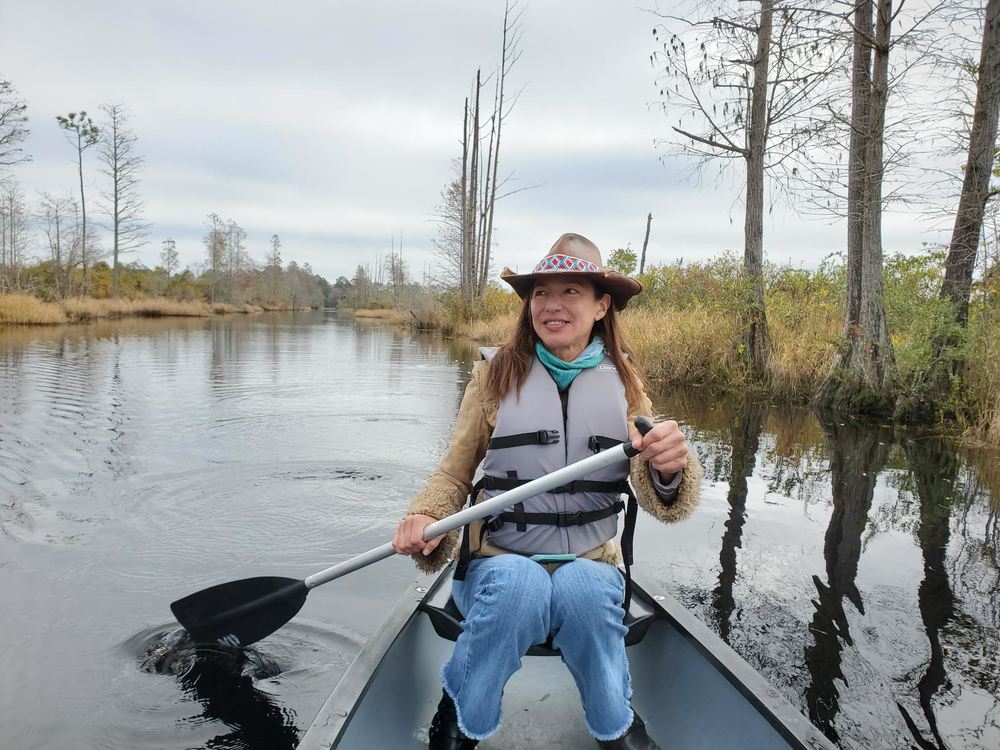
Caption
Rena Peck of the Georgia River Network paddles a canoe in the Okefenokee Swamp, which she fears would be harmed by a proposed mine nearby.
Credit: Emily Jones

Rena Peck of the Georgia River Network paddles a canoe in the Okefenokee Swamp, which she fears would be harmed by a proposed mine nearby.
The avalanche of mailers and TV ads about Georgia’s U.S. Senate runoff would have you believe we’re headed for utopia or apocalypse, depending on who controls the Senate. But while the stakes are high, the reality is a lot more complicated.
“A Democratic sweep in the Georgia runoff election is not going to lead to a major new progressive environmental legislation like the Green New Deal,” Mercer law professor Steve Johnson said.
He believes a Democratic-controlled Senate would be more likely to pass legislation on climate change, but that it would probably be more moderate.
But control of the Senate is still important for President-elect Biden’s environmental agenda, because Congress controls funding for key agencies such as the Environmental Protection Agency. Also, the Senate must approve Biden’s appointments to positions including EPA administrator.
A lot of the Trump administration’s actions on the environment didn’t go through Congress, however. Instead, Trump reinterpreted old laws, just as Obama did before him. Johnson said Biden could re-reinterpret those laws. Again.
“He can undo a lot of the regulatory actions that the Trump administration has put into effect through new rulemaking,“ Johnson said.
But changing rules and regulations takes time, often years.
Meanwhile, projects and permits affected by those federal rules — along with issues such as the proposed mine near the Okefenokee swamp — don’t wait for a new president to make new rules.
So environmental advocates such as Rena Peck of the Georgia River Network are focused on state regulators.
“Now, the onus is on the Environmental Protection Division to decide what are the potential environmental risks to the Okefenokee as well as to habitats on Trail Ridge," Peck said. "And is it worth the risk economically and environmentally?”
She fears the Okefenokee would be harmed by a mine nearby, while the mining company contends it can work safely. A Trump administration rule change leaves it up to the state to look at the science and decide.
The Georgia Mining Association declined to comment on possible changes before they happen. So did state and federal regulators.
Ideally, Peck would like stronger federal laws to make environmental rules less changeable.
“So Congress really needs to amend the Clean Water Act to definitively state what is and what's not included under the jurisdiction of the Clean Water Act,” she said. “And this is helped if Democrats control the Senate. But even then, it's a heavy lift.”
Any legislation, just like any regulatory changes, would take a long time to enact.
But control of the Senate would give Democrats one key fast track: the Congressional Review Act. It gives Congress the power to do away with very recent rules made by a president much faster than going through the normal review process. Congress reversed 16 Obama-era rules.
“So if the Democrats control the House and the Senate after the election and after the president is sworn in, they could use the Congressional Review Act to overturn a few of the Trump administration's environmental rollbacks from the end of his term.”
It wouldn’t affect the Okefenokee. The rules affecting the proposed mine there changed too long ago. But it could reverse other recent rules on coal ash, migratory birds, and endangered species.
But whether Congress acts on any of that, or passes broader environmental laws, likely depends on the outcome of Georgia’s Senate contests.